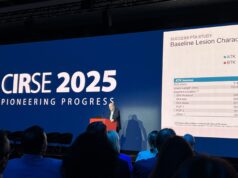
Clinical outcomes from the IMPERIAL Long Lesion Sub-study were presented at VIVA (5–8 November, Las Vegas, USA) demonstrating that the Eluvia drug-eluting vascular stent system (Boston Scientific) is safe and effective in treating patients with long, complex, calcified lesions within the superficial femoral and proximal popliteal arteries.
The global randomised controlled IMPERIAL trial, which evaluated the Eluvia Stent System in patients with symptomatic peripheral arterial disease (PAD), included a single-arm analysis of 50 patients with femoropopliteal artery lesions 140–190 mm in length. Baseline characteristics of the patients included an average lesion length of 162.8±34.7mm, with 70% of lesions classified as moderately to severely calcified and 32% with chronic total occlusions. Due to the severity of their disease, these patients were also experiencing claudication.
The study results demonstrate that the primary patency rate, a measure of the target vessel remaining unobstructed at 12 months, was 87.9%. Study participants also experienced low rates of target lesion revascularisation (TLR), at 6.5%, indicating a reduced need for repeat procedures at one year. Additionally, these patients reported significant improvement in the decrease of their leg pain and discomfort.
“The lesion lengths, disease complexity and the baseline characteristics presented in this sub-study is more representative of what clinicians see on a daily basis when treating patients with severe cases of peripheral artery disease,” said William Gray, system chief, Division of Cardiovascular Disease at Main Line Health, president of Lankenau Heart Institute in Wynnewood, USA, and co-principal investigator of the IMPERIAL trial. “The results from this long lesion sub-study, combined with those observed in the global randomised controlled IMPERIAL trial, MAJESTIC and other studies suggest that the Eluvia stent, with its sustained drug release design, is a highly effective treatment option for femoropopliteal disease even in more complex lesion types.”
In the IMPERIAL trial, the first randomised head-to-head trial comparing two different drug-eluting stent systems for the treatment of PAD, the Eluvia stent demonstrated superior results as patients experienced significantly greater 12-month primary patency of 88.5%, compared to 79.5% in patients treated with the Zilver PTX Stent System from Cook Medical (p=0.0119). In addition, patients treated with the Eluvia stent had half the target lesion revascularisation rate of Zilver PTX at 12 months, a 4.5% TLR rate for Eluvia versus 9% TLR rate for the Zilver PTX cohort.
As a result of the IMPERIAL Long Lesion Sub-study findings, the Eluvia stent received approval from the US Food and Drug Administration (FDA) to treat long lesions within the superficial femoral and proximal popliteal arteries, up to 190mm in length, in patients with peripheral arterial disease. The Eluvia stent received approval from the FDA in September of 2018 and CE Mark in February of 2016.












